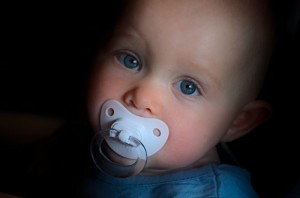In the press briefings over the weekend there has been a lot of ducking and diving to try and put a positive spin on developments … which quite frankly comes across like spitting in the wind. The USA says we can still do what’s required by 2020 without making binding commitments now! Along with Brazil, Canada, China, etc., they’re all simply spitting into the wind.
The child in the photo alongside, is a (junior) member of CSAG “attending” COP 17, a member of the human race, a member of that all-age group who are uneducated and unaware, and a member of the generation inheriting our decisions. She inherits what the public relation’s spin is putting out on our mitigation and adaptation decisions … she is likely to inherit our spit!
At the other end of the spectrum are the “Educated and Aware”, those who sit today in the halls of the conference center in Durban. Rather like the apocryphal story of Nero who fiddled while Rome burned (see here), these “leaders” are well educated, trained, and experienced. They are all well aware, steeped in the language and concepts of climate change. But aware does not mean sensitized. They fiddle in the face of a time-imperative to act, playing with trivial “successes” while the elephant in the room marches on.
How do we measure the actions of these “Educated and Aware”? Stephen Lacey (here) reports a conversation on how to measure success, presenting a view that the small successes are a measure of value, and that “If people think it’s a total failure, they just don’t understand the negotiations”. But this seems like more spit in the wind. Nobody denies these small incremental developments are good. But what nobody wants to stare in the face is the high cost of inaction (see here, here, and here). The measure for the success of actions at COP is, and needs to be, stringent indeed.
A True Story: In the chasm between the “Uneducated and Unaware” and the “Educated and Aware”, lie most of the world in that variable mix of semi-educated and semi-aware. In an encounter this last Friday two of these people met in discussion. For anonymity I’ll call the first person Abebe, and she lives in semi-poverty (like the majority of the world). The second person I’ll call Susan, who comes from the upper-middle class (the minority of the world).
Susan has been helping Abebe to improve her dwelling, and while doing this overheard Abebe talking in her native language with some friends. Susan doesn’t know the language, but heard the word “climate” in the conversation. It turns out they were talking about the TV and radio news which was full of stories about COP 17 and climate change, but they had absolutely no understanding of this “climate change.” Susan tried to explain, but it was of questionable success.
There was another man there from Adebe’s church, helping her with some painting. He was cleaning the paint brush and Susan only just prevented him from throwing out the turpentine onto a butternut plant that is growing outside Adebe’s front door … a plant which, if nurtured, can provide butternut soup.
Does Adebe know why or how she and her neighbours should be changing their lifestyles? The answer is no.
Can Adebe and her neighbours change their lifestyles? Not much.
Are Adebe and her neighbours vulnerable to change? Certainly; they live on the edge and it doesn’t take much to be pushed over the threshold.
Susan, by choosing to change her lifestyle with some recycling, slower driving, and greener living, can contribute to a global difference, and can shield Adebe from some of the spit blowing back in the wind.
But who is reaching to all the Adebes of the world to help them make those small personal changes that can benefit their own space? I deal with policy makers, decision makers, governments and major stakeholders. Yet, how do I / we contribute to the billions of those living like Adebe?
Monday wish: that the “Educated and Aware” can stand for a day in the wind with Adebe and the children.
